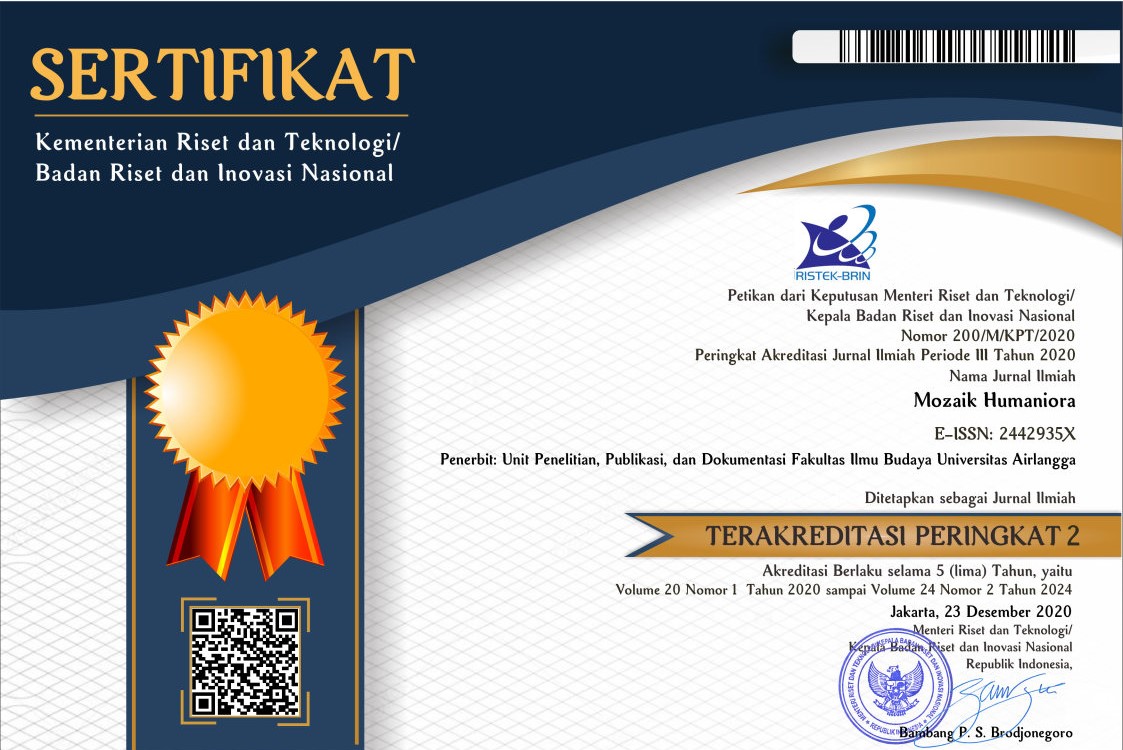A DIACHRONIC STUDY OF THE AUTHORIAL IDENTITY IN TOURISM RESEARCH ARTICLES
Downloads
The use of first-person pronouns (I, we) in writing research articles was remaining problematic for both inexperienced and advanced authors. Nevertheless, some research suggested that the FPPs were increasingly used in writing research articles (RAs) to indicate the authorial identity. This research aimed to investigate types, functions, and correlation of the FPPs in tourism RAs by employing the diachronic corpus linguistics method. The data of this research were accessed and downloaded through five open access journals published by Elsevier. There were 80 selected tourism RAs from the year 2015 to 2020 that classified into five corpora. AntConc was software that was employed to retrieve the FPPs from the corpora. This research discovered the FPPs I and we were constructed as six types of authorial identity that range from the least to the strongest authoritative identity in the past five years. The constructed authorial identity had three main functions for the authors of tourism RAs, tourism as an academic discipline, and the readers of tourism RAs. The statistical calculation showed that the correlation was 0.87 that signified the use of the FPPs was increasing in the following year.
Keywords: authorial identity, diachronic corpus linguistics, the first-person pronouns, tourism research articles.
Anthony, Laurent. 2019a. AntConc (version 3.5.8). Tokyo: Waseda University. https://www.laurenceanthony.net/software/antconc/.
———. 2019b. AntFileConverter (version 1.2.1). Tokyo: Waseda University. https://www.laurenceanthony.net/software/antfileconverter/.
Biber, Douglas, and Edward Finegan. 1989. "Drift and the Evolution of English Style: A History of Three Genres.” Language 65 (3): 487–517. https://doi.org/10.2307/415220.
Chang, Yu-Ying, and John M. Swales. 2014. "Informal Elements in English Academic Writing: Threats or Opportunities for Advanced Non-Native Speakers?” In Writing: Texts, Processes and Practices, edited by Christopher N. Candlin and Ken Hyland. New York: Routledge.
Cheng, Rong. 2020. "Single Author Self-Reference: Identity Construction and Pragmatic Competence.” Journal of English for Academic Purposes 45: 1–14. https://doi.org/10.1016/j.jeap.2020.100856.
Creswell, John W. 2014. Research Design: Qualitative, Quantitative, and Mixed Methods Approaches. Fourth Edition. Thousand Oaks: Sage Publications, Inc.
Dörnyei, Zoltan. 2007. Research Methods in Applied Linguistics. Oxford: Oxford University Press.
Hyland, Ken. 2001. "Humble Servants of the Discipline? Self-Mention in Research Articles.” English for Specific Purposes 20: 207–26.
Hyland, Ken, and Feng (Kevin) Jiang. 2017. "Is Academic Writing Becoming More Informal?” English for Specific Purposes 45: 40–51. https://doi.org/10.1016/j.esp.2016.09.001.
Leedham, Maria, and Maria Fernandez-Parra. 2017. "Recounting and Reflecting: The Use of First Person Pronouns in Chinese, Greek and British Students' Assignments in Engineering.” Journal of English for Academic Purposes 26: 66–77. https://doi.org/10.1016/j.jeap.2017.02.001.
McCrostie, James. 2008. "Writer Visibility in EFL Learner Academic Writing: A Corpus-Based Study.” ICAME Journal 32: 97–114.
Myers, Greg. 2001. "‘In My Opinion': The Place of Personal Views in Undergraduate Essays.” In Academic Writing in Context: Implications and Applications, edited by Martin Hewings. Birmingham: The University of Birmingham.
Paltridge, Brian, and Sue Starfield. 2007. Thesis and Dissertation Writing in a Second Language: A Handbook for Supervisors. London: Routledge.
Swales, John M., and Christine B. Feak. 2012. Academic Writing for Graduate Students: Essential Skills and Tasks. 3rd Edition. Michigan: University of Michigan Press/ELT.
Tang, Ramona, and Suganthi John. 1999. "The ‘I' in Identity: Exploring Writer Identity in Student Academic Writing through the First Person Pronoun.” English for Specific Purposes 18: 23–39.
Taylor, Helen, and John Goodall. 2019. "A Preliminary Investigation into the Rhetorical Function of ‘I' in Different Genres of Successful Business Student Academic Writing.” Journal of English for Academic Purposes 38: 135–45. https://doi.org/10.1016/j.jeap.2019.01.009.
Vázquez, Lucía Muñoz. 2015. "Curious of the Benefits of Publishing with Elsevier?” 2015. https://www.elsevier.com/authors-update/story/tutorials-and-resources/curious-of-the-benefits-of-publishing-with-elsevier.
Wallwork, Adrian. 2011. English for Writing Research Papers. New York: Springer.
Zareva, Alla. 2013. "Self-Mention and the Projection of Multiple Identity Roles in TESOL Graduate Student Presentations: The Influence of the Written Academic Genres.” English for Specific Purposes 32: 72–83. https://doi.org/10.1016/j.esp.2012.11.001.

Mozaik Humaniora is licensed under a Creative Commons Attribution-ShareAlike 4.0 International License. Both authors and Mozaik Humaniora agree with the following attribution of journal:
1. Copyright of this journal is possession of Author, by the knowledge of the Editorial Board and Journal Manager, while the moral right of the publication belongs to the author.
2. The journal allows the author(s) to retain publishing rights without restrictions
3. The legal formal aspect of journal publication accessibility refers to Creative Commons Attribution Share-Alike (CC BY-SA).
4. The Creative Commons Attribution Share-Alike (CC BY-SA) license allows re-distribution and re-use of a licensed work on the conditions that the creator is appropriately credited and that any derivative work is made available under "the same, similar or a compatible license”. Other than the conditions mentioned above, the editorial board is not responsible for copyright violation.


















